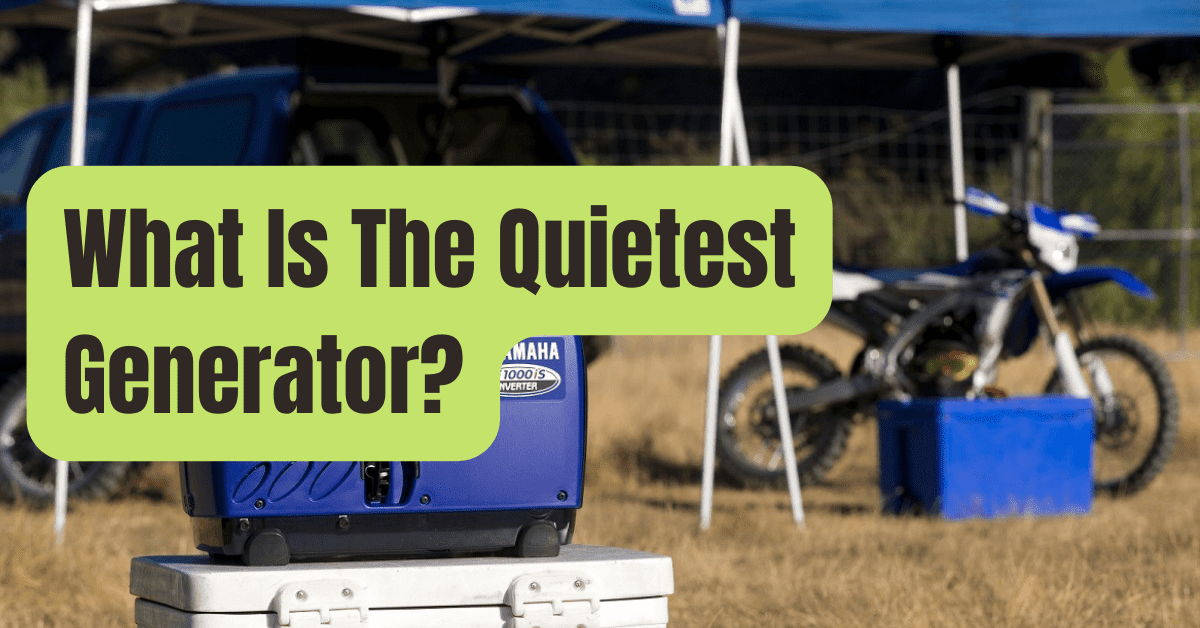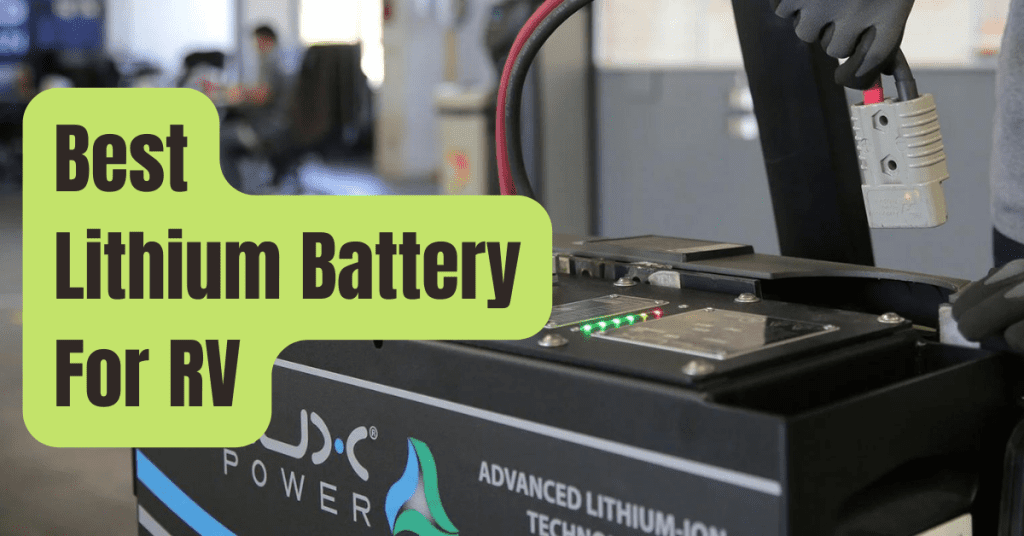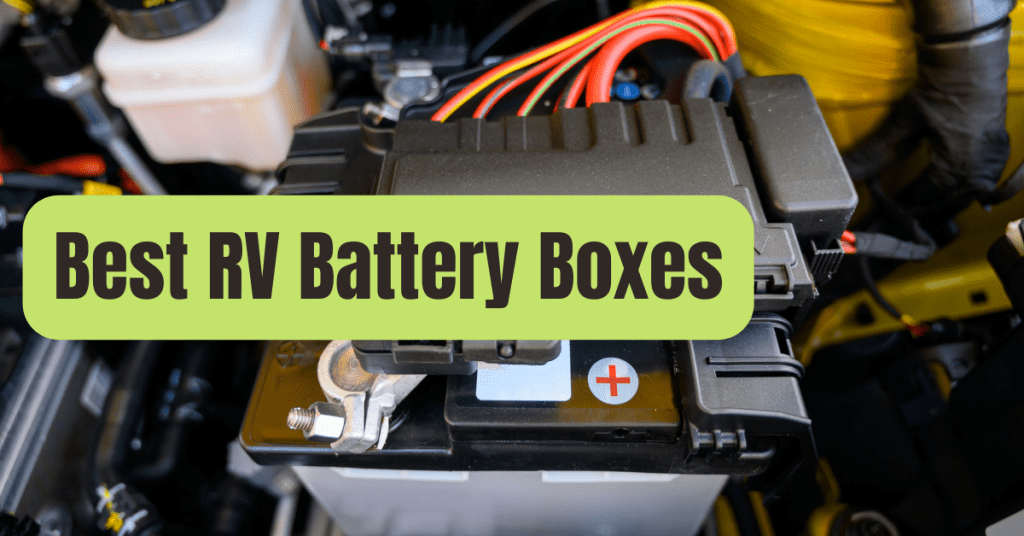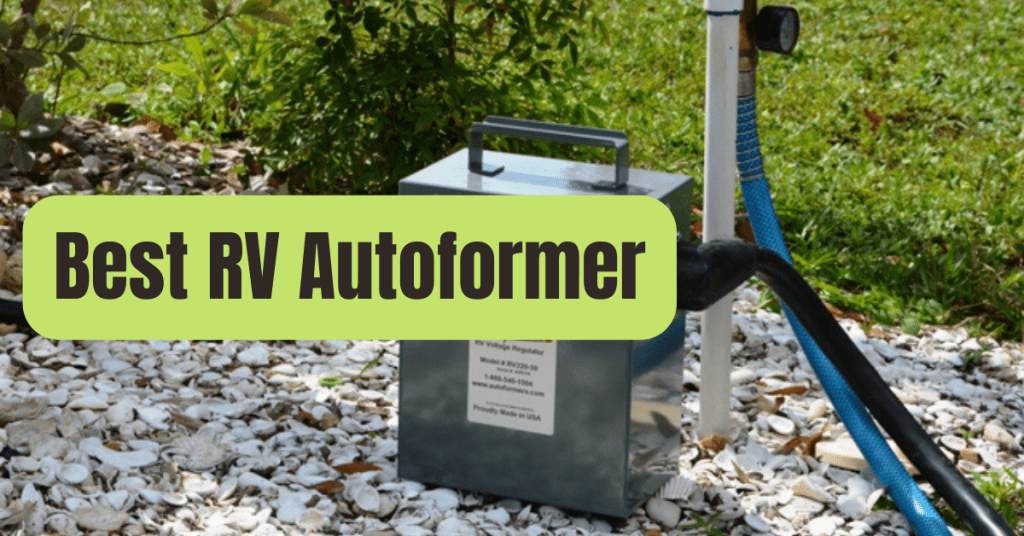Let’s face it, power generators may be a nuisance.
Larger 10,000W+ generators may emit more than 75 dB of noise even while running at 25% load (measured at 23 ft distance).
Today, we’ll look at generators that make the least amount of noise, and we’ll look at the top five quietest generators on the market right now.
Why would you want a generator that is very quiet? Nobody enjoys noisy generators, to be sure.
A silent home generator will not wake you up or bother your neighbors.
A silent generator is preferable than a noisy generator for camping or RV use.
Generators that emit more than 80 decibels of noise are generally deemed ‘loud.’ Quiet generators are defined as those that create less than 60 decibels of noise.
Furthermore, you must be mindful of noise generating decibel constraints.
These are some of them:
- Some localities and homeowner’s associations (HOAs) require that your home generator be kept at or below 75 decibels. Anything more than that may result in a fine, particularly if you’re operating a generator for a lengthy time.
- A basic guideline for camping areas is that generators should not exceed 65 decibels in proximity. The finest and quietest generators for camping.
What method can we use to determine which generators are the quietest?
In principle, that should be simple.
Examine 100 of the best-selling generators, open the specification papers, and record the noise levels (in decibels) of each generator.
It’s simple to determine which generators make the least amount of noise.
That’s precisely what we did while compiling a list of the 5 quietest generators presently available (in the 50 dB range).
Further down, you’ll discover a list of the quietest generators, together with spec-by-spec (dB-by-dB) comparisons and reviews.
Note: There is no question which generator is by far the quietest, and has been for years.
The Honda inverter generator is what it’s called.
You may go directly to this section of the list:
In reality, though, you must take into consideration a number of additional factors.
A modest 2,500W generator, for example, is always quieter than a large 10,000W generator.
To discover the optimal balance between the generator’s noise levels and power production, we added a new parameter called Watts Per dB.
A silent generator’s starting wattages, operating wattages, tank capacity, and maximum running duration should all be checked.
Of course, you must also consider the cost of a silent generator, the brand of the generator, and user feedback.
All of these parameters for silent generators are compared in the list of whisper-quiet generators below.
We’ll go through these essential characteristics to find out what you’re truly comparing.
However, it is critical for anybody trying to purchase a quiet generator to first understand how we determine which generators are quiet and which are noisy.
This is how we go about it:
How Do We Measure Generator Quietness/Loudness?
We need to look at how we measure the noise levels of 50-95 dB generators before we can see how loud they are.
There’s one important feature that applies to all generators, even the ultra-quiet ones.
If you look at any generator’s specifications sheet, you’ll see something like this:
- Noise levels range from 68 to 74 decibels.
When a generator is working at 1/4 (25 percent) load, the first decibel level (lower sound limit) relates to the quantity of noise it creates.
A 3,000W generator would provide 750W of electricity in this situation.
A massive 10,000W would generate a 2,500W burden.
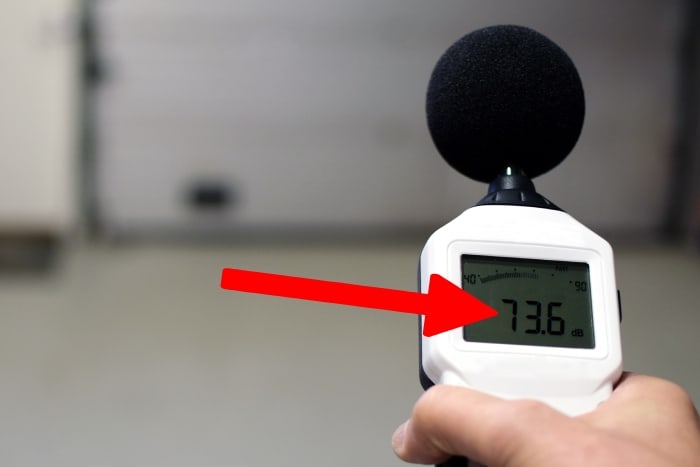
Normally, you run a generator at more than 1/4 load.
When the generator is functioning at full load, the second decibel level (higher sound limit) relates to the quantity of noise it makes (100 percent output).
That instance, when a 2,500W produces a complete 2,500W of power output, for example.
Here’s the important information you should be aware of:
Generator noise levels are measured from a distance of 23 feet.
That’s correct.
Only when a generator with a maximum noise level of 74 dB is 23 feet (or 7 meters) distant would it create 74 dB.
If you stand near to a 74 dB generator, your ears will almost certainly be bombarded by 80+ dB noise.
The notion of a quiet sub 60 dB generator appeals to me since human hearing can only withstand noise levels over 85 dB for so long.
Let’s look at some decibel equivalents to see how loud generators really are:
Quiet Generator Decibel Levels
To determine how loud or silent a generator is, we utilize decibels (dB).
Wikipedia’s definition of decibels is a little more complicated: ‘A decibel is a one-tenth of a bel relative unit of measurement (B).
On a logarithmic scale, it represents the ratio of two values of a power or root-power quantity.
A power ratio of 101/10 (roughly 1.26) or a root-power ratio of 101/20 (about 1.12) exists between two signals whose levels vary by one decibel.’
Let’s look at some real-life situations to further clarify this.
0 dB is scarcely audible.
Breathing produces a noise of 10 decibels.
Whispering is at 30 decibels, and refrigerators are generally around 50 decibels.
Here’s a good example of varying dB sounds:
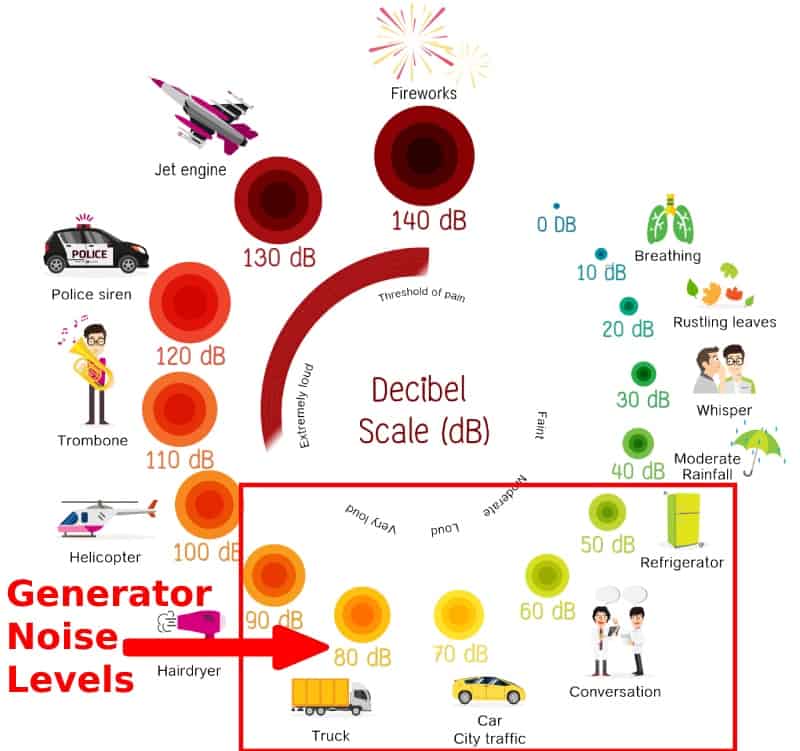
As you can see, silent generators have sound levels comparable to a refrigerator (50 dB) or a conversation (60 dB).
Louder generators can make as much noise as a truck (80 decibels) or even a hair dryer (90 dB).
If you’re trying to figure out how loud a 74 dB generator is, for example, you can use this diagram.
A generator with a decibel rating of 74 is as loud as a car or a bus (somewhere in between).
The sound ranges and, as a result, the categorization of generators based on the amount of noise they generate are as follows:
- Quietest Generator: Below 50 dB.
- Quiet Generators: 50-60 dB.
- Quieter-Than-Average Generators: 60-70 dB.
- Average Noise Generators: 70-80 dB.
- Louder-Than-Average Generators: 80-90 dB.
- Loud Generators: Above 90 dB.
Everyone now wants the quietest generator possible.
However, we must include generator wattage as well:
Wattage For Starting And Running (+ Watts Per Decibel Rating)
You’ll need a large generator if there’s a power outage or if you’re going camping.
Whole-house generators with 10,000W+ operating wattages are employed in the event of a power outage.
For camping and RVs, silent generators with an operating power of 2,000-3,000W are required.
Small camping generators are obviously quieter than large whole-house generators during power outages.
They may, however, provide 3-10 times less power output.
The most important question here is:
When evaluating which generators are the quietest, how can we account for varying power generation?
Example: #1 Honda EU3000IS has an operating power of 2,800W and a noise level of 49 dB at 25% load (Honda generator is an incredibly amazingly quiet generator).
#3 DuroMax XP13000EH has a 25 percent load noise level of 74 dB and provides 10,500W operating wattages.
Which is the quietest of the two?
The #1 Honda EU3000IS is obviously the quieter generator (49 dB vs 74 dB).
That’s hardly unexpected, given that Honda is known for making the quietest generators, with the EU3000IS model being the quietest of them all.
However, we must also consider the production of electricity.
#3 The DuroMax XP13000EH produces 10,500W compared to the Honda’s 2,800W operating watts.
Bigger generators make more noise than smaller generators; how can the sound-power compromise be achieved on the same common denominator?
The ‘Watts Per dB’ ratio is the best sound-power tradeoff rating.
This ratio simply indicates how many operating watts a generator produces per one decibel (dB).
Here’s how to figure it out:
Watts Per dB Ratio = Running Wattage (W) ÷ Noise Levels (dB)
The #1 Honda EU3000IS, for example, has an operating wattage of 2,800W and a noise level of 49 dB, resulting in a ‘Watts Per dB’ ratio of 58W per dB.
#3 DuroMax XP13000EH has an operating wattage of 10,500W and a noise level of 74 dB, resulting in a ‘Watts Per dB’ ratio of 135W per dB.
That implies that per 1 dB, the #3 DuroMax XP13000EH will create 135W of beginning watts.
That implies it has a greater ‘Watts Per dB’ ratio than the Honda EU3000IS, the world’s quietest generator (58W per dB).
We may deduce from this that, although producing 74 dB noise levels at 25% load, the #3 DuroMax XP13000EH is a rather quiet generator for a whole-house generator.
A ‘Watts Per dB’ ratio of less than 50 for a large 10,000W generator would be a huge warning signal for choosing quiet generators.
We’d instantly recognize it as a really noisy generator.
Maximum Tank Capacity and Running Time
The most effective silent generator should be as quiet as a mouse.
Furthermore, it would be an excellent generator.
The best generators must have a large enough fuel or propane tank capacity to power the generator for at least 10 hours.
These devices will have fuel tanks ranging from 1 to 10 gallons, depending on the generator capacity.
Generators may operate on either gasoline or propane, or a combination of the two (quiet dual fuel generators).
Here are the energy densities of gasoline and liquid propane (LPG), according to Engineering Toolbox:
- 1 gallon of gasoline the energy content is 124.000 BTU. That 1 gallon of fuel may produce 36.34 kWh of electricity. You can operate a 3,000W running power generator for more than 12 hours at 100 percent efficiency.
- 1 gallon of liquid propane the energy content of LPG (liquid petroleum gas) is 91.330 BTU. That 1 gallon of liquid petroleum can produce 26.77 kWh of electricity. You can operate a 3,000W operating watts generator for about 9 hours at 100% generator efficiency.
Quiet Generators’ Energy Efficiency (Inverters Are The Most Energy Efficient)
Because the energy density of gasoline is 36 percent larger than that of liquid propane, gasoline generators will have a 36 percent longer operating duration.
Inverter gasoline generators are the most energy-efficient silent generators.
Example: #1 The Honda EU3000IS inverter generator is the quietest on the market.
It has a 3.4-gallon petrol tank and can operate for 20 hours on 2,800W power.
Note: An inverter generator has the extra benefit of being able to operate at exceptionally low noise levels for a generator.
The 3.4-gallon Honda tank can carry 421.600 BTU of gasoline.
This would create 123.56 kWh of power with 100 percent efficiency.
The following are some of the reasons why silent inverter generators are preferred:
The conventional generator operates at full load (generally 100 percent) all of the time.
That implies that even if you don’t need 5,000W, the typical generator will burn up the gas producing 5,000W whether or not you require it.
It will always make a lot of noise.
The inverter generator, on the other hand, changes its power production in response to the electric demand.
When the electric demand is reduced, it may lower power production (and hence reduce noise levels).
Inverter generators are substantially more energy efficient and silent than normal generators because of this.
Note: It should come as no surprise that the majority of silent generators are inverter generators.
With that in mind, let’s take a look at which generators are the quietest on the market:
5 Best Quiet Generators (Reviews + Comparison Table)
- Quietest Inverter Generator By Honda: Honda EU3000IS (3,000W, 49 dB)
- Best Quiet Generator For RV And Mobile Home: Westinghouse iGen4500 (4,500W, 52 dB)
- Bigger Quiet Whole House Generator: DuroMax XP13000EH (13,000W, 74 dB)
- Small Portable Quiet Generator For Camping: WEN 56203i (2,000W, 51 dB)
- Quiet Dual Fuel Portable Generator For Camping: Champion 200951 (2,500W, 53 dB)
| Generator: | #1 Honda EU3000IS | #2 Westing House iGen4500 | #3 DuroMax XP13000EH | #4 WEN 56203i | #5 Champion 200951 |
|---|---|---|---|---|---|
| Photo: | 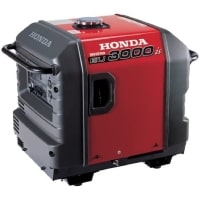 |
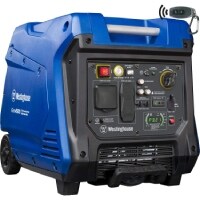 |
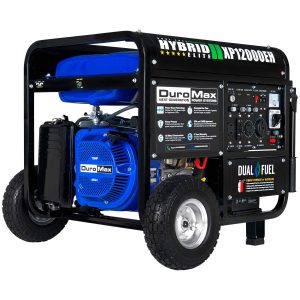 |
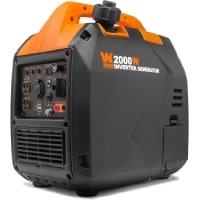 |
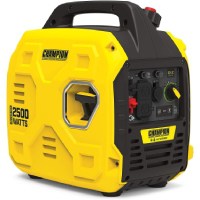 |
| Noise Levels (25%): | 49 dB | 52 dB | 74 dB | 51 dB | 53 dB |
| Running Watts: | 2,800 W | 3,700 W | 10,500 W | 1,700 W | 1,850 W |
| Starting Watts: | 3,000 W | 4,500 W | 13,000 W | 2,000 W | 2,500 W |
| Watts Per dB: | 58 W Per dB | 71 W per dB | 135 W per dB | 33 W per dB | 35 W Per dB |
| Tank Capacity: | 3.4 gallons | 3.4 gallons | 8.3 gallons | 1.0 gallons | 1.1 gallons |
| Max. Run Time: | 20 hours | 18 hours | 16 hours | 10.8 hours | 11.5 hours |
| Average Rating: | 4.9 Start | 4.6 Start | 4.5 Start | 4.2 Start | 4.1 Start |
#1. Quietest Inverter Generator By Honda: Honda EU3000IS (3,000W, 49 dB)
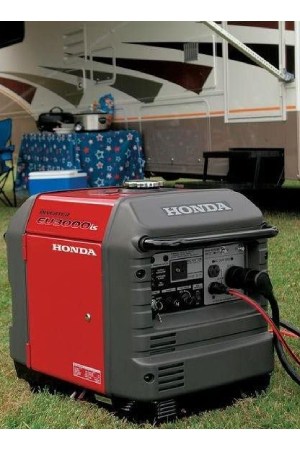
| Noise Levels: | 49 dB |
| Running Watts: | 2,800 W |
| Starting Watts: | 3,000 W |
| Watts Per dB: | 58 W Per dB |
| Tank Capacity: | 3.4 gallons |
| Max. Run Time: | 20 hours |
| Dimensions (LxWxH): | 27 x 26 x 21 inches |
| Weight: | 131 lbs |
| Rating: | 4.9 Start |
There is no question which generator is the ultimate quietest on the market and has been the quietest generator for many years.
It’s the Honda EU3000IS sophisticated inverter generator.
Honda generators are known for being whisper quiet, and the Honda EU3000IS is their top model.
This generator has a starting wattage of 3,000W and a running wattage of 2,800W.
At 25% load, it is the only generator that produces less than 50 dB of noise (49 dB, to be exact).
It has a power-to-dB ratio of 58.
The Honda EU3000IS produces absurdly low 58 dB noise levels even at full load, generating 2,800W.
What is Honda’s sound-producing secret that no other generator manufacturer can match?
The advanced Eco Throttle® System inverter technology is patented.
The inverter generator on the Honda precisely matches the power output to the power demand.
In the Honda Super Quiet generators series, the Honda EU3000IS is the top-rated model.
It is also the most energy-efficient silent generator thanks to the Eco Throttle inverter technology.
It has a maximum operating duration of up to 20 hours with a 3.4 gallon tank.
That is longer than any other generator that is completely quiet.
The Honda EU3000IS is well-liked for its quietness, but it is not well-liked for its price.
This is the only flaw in it.
Overall, thanks to Honda’s advanced Eco Throttle inverter technology, the Honda EU3000IS is the quietest generator on the market.
It’s the only one that produces less than 50 decibels of noise at 25% load, is extremely energy efficient, and is an extremely dependable generator that will last you 10 years or more:
Review of the Honda EU3000IS
Pros
- By far the quietest generator in recent years (only 49 dB at 25 percent load)
- Honda’s Eco Throttle inverter technology is at the heart of this vehicle (precisely adjusts power load to power demand)
- Gas generator with the highest energy efficiency
- On a 3.4-gallon gasoline tank, the longest running time (up to 20 hours) is possible.
- Honda is recognized for producing generators that are both dependable and very quiet.
Cons
- It’s a touch too hefty to take camping (131 lbs total weight)
#2. Best Quiet Generator For RV And Mobile Home: Westinghouse iGen4500 (4,500W, 52 dB)
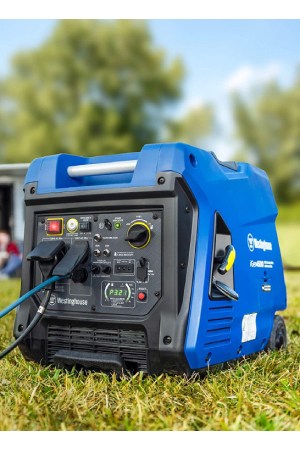
| Noise Levels: | 52 dB |
| Running Watts: | 3,700 W |
| Starting Watts: | 4,500 W |
| Watts Per dB: | 71 W per dB |
| Tank Capacity: | 3.4 gallons |
| Max. Run Time: | 18 hours |
| Dimensions (LxWxH): | 24.5 x 17.5 x 20 inches |
| Weight: | 93 lbs |
| Rating: | 4.6 Start |
The full name of the Westinghouse iGen4500 is ‘Westinghouse iGen4500 Super Quiet Portable Inverter Generator.’ In this power range, this is the quietest Westinghouse generator.
It’s a wonderful silent generator for RVs and mobile homes, weighing just 93 pounds.
It has a starting wattage of 4,500W and a running wattage of 3,700W.
For a generator as quiet as the Westinghouse iGen4500, that’s a lot of power.
It barely makes 52 decibels of noise at 25% load.
To put it in context, it boasts a 71W per dB ratio, which is greater than the 58W per dB ratio of the #1 Honda.
This is, of course, a portable inverter generator.
Inverter generators, such as the Westinghouse iGen4500, make very little noise and have above-average energy efficiency.
The Westinghouse iGen4500, for example, has a 3.4-gallon gas tank.
You can operate it for up to 18 hours with a full tank.
That’s a lot longer than non-inverter generators, which typically operate for less than 12 hours.
Its higher-than-average wattage (which you may require in a mobile home) and weight of less than 100 pounds make it particularly suitable for RVs and mobile homes (93 lbs, to be exact).
That is too hefty for camping, but it is the ideal weight for a quiet RV or mobile home generator.
Overall, the Westinghouse iGen4500 is one of the best extremely silent generators for mobile homes and recreational vehicles.
It’s really quiet, energy-efficient, doesn’t weigh a ton, and costs a little fortune:
Review of the Westinghouse iGen4500
Pros
- One of the quietest generators on the market (52 dB noise levels at 25 percent load)
- Is an inverter generator, which means it is quieter and more energy efficient.
- On a 3.4 gasoline tank, it can run for up to 18 hours.
- For a 4,500W starting wattage generator, the 71W per dB ratio is one of the greatest.
- Despite being so quiet, the pricing is reasonable.
Cons
- It’s tough to fix, and parts are difficult to come by.
- It’s fairly exposed, and rain and high inside humidity don’t do it any favors (above 80 percent )
#3. Bigger Quiet Whole House Generator: DuroMax XP13000EH (13,000W, 74 dB)
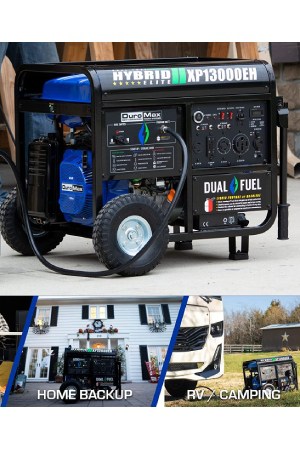
| Noise Levels: | 74 dB |
| Running Watts: | 10,500 W |
| Starting Watts: | 13,000 W |
| Watts Per dB: | 135 W per dB |
| Tank Capacity: | 8.3 gallons |
| Max. Run Time: | 16 hours |
| Dimensions (LxWxH): | 30 x 29 x 26 inches |
| Weight: | 234 lbs |
| Rating: | 4.5 Start |
The DuroMax XP13000EH is a genuine beast.
This is a large, silent whole-house generator for power outages (such as the ones that occurred in Texas in February 2021).
With a starting wattage of 13,000W and a running wattage of 10,500W, it can power an entire house’s worth of electric gadgets.
It can even power a 5-ton air conditioner.
Let’s have a look at the noise levels now.
At 25% load, the DuroMax XP13000EH generates 74 dB, which is quite a bit more than the lower sub 5,000W operating wattage devices.
Here’s the truth, which is a little unsettling:
There is no whole-house generator that is quiet.
The best you can do is acquire the quietest home generator you can find, which is the DuroMax XP13000EH, which has a noise level of 74 decibels.
When measured in terms of watts per decibel, the DuroMax XP13000EH is one of the quietest large generators available.
It has a 10,500W operating wattage (enough to power a whole home) and a 135W per dB ratio.
Even with a large generator, that’s a lot.
The DuroMax XP13000EH is a dual fuel generator in terms of fuel.
It may be filled with gasoline or liquid propane (gasoline is preferable due to higher energy content per gallon).
It features a large 8.3-gallon tank that can last up to 16 hours when loaded with fuel.
Overall, the DuroMax XP13000EH is a good option if you need a large, quiet dual fuel generator for your house.
Yes, it has a noise level of 74 decibels, however all other 10,000W+ generators have far greater noise levels (several exceeding 85 decibels).
DuroMax XP13000EH Review
Pros
- Largest and quietest generator (10,000W+) (produces 74 dB noise levels at 25 percent load)
- It has a 135W per dB ration, which is exceptionally high (impressive even for a bigger generator)
- Can you power all of your home’s electric devices? (even a 5-ton AC or furnace)
- With an 8.3 gallon dual fuel (gasoline and liquid propane) tank, it can operate for up to 16 hours.
- DuroMax is a skilled and trustworthy generator manufacturer.
Cons
- Unfortunately, although 74 dB is low for a large generator, it is not that low for our hearing.
- It’s hefty, weighing up at 234 pounds, and it’s tough to move about (despite the wheels)
- It’s rather enormous, measuring 30 x 29 x 26 inches, and you’ll have to give up some garage room to keep it.
#4. Small Portable Quiet Generator For Camping: WEN 56203i (2,000W, 51 dB)
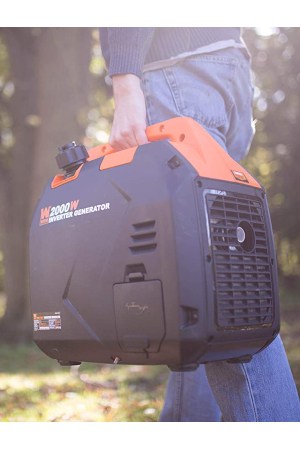
| Noise Levels: | 51 dB |
| Running Watts: | 1,700 W |
| Starting Watts: | 2,000 W |
| Watts Per dB: | 33 W per dB |
| Tank Capacity: | 1.0 gallons |
| Max. Run Time: | 10.8 hours |
| Dimensions (LxWxH): | 17.3 x 11.5 x 17.7 inches |
| Weight: | 39 lbs |
| Rating: | 4.2 Start |
Here’s the thing with camping generators that are silent.
It isn’t enough that they be deafeningly quiet.
They must be large enough to power all of your electric equipment while camping (over 1,000W continuous wattage) and light enough to carry (below 50 lbs).
The WEN 56203i is the greatest silent camping generator that meets all of the criteria.
This portable generator has a starting power of 2,000W and an operating wattage of 1,700W.
It barely produces 51 dB at 1⁄4 load.
That’s quiet enough for camping areas (it has to be under 65 decibels) and even for you to sleep near it.
The inverter 4-stroke 79cc OHV motor is the key to the low noise levels.
This inverter camping generator will be as quiet as possible and as energy-efficient as possible thanks to the eco-mode option.
The power output (and, as a result, the decibel output) varies in response to the power demand.
That implies that if you’re camping and just need to charge your phone, the WEN 56203i won’t work at full capacity.
The load will be lowered by as much as 20%, resulting in considerable reductions in noise levels.
The weight of a silent portable generator for camping is a significant consideration.
Anything more than 50 pounds is quite hard to transport around the campsite (and most generators are much heavier than 50 lbs).
The WEN 56203i weighs just 39 pounds and is very portable (you will still need stong hands).
It can operate for up to 10.8 hours on a full 1.0-gallon fuel tank.
Review of the WEN 56203i
Pros
- It barely generates 51 dB at 1/4 load.
- 1,700 watts is more than enough to power all of your camping electronic gear.
- The use of an inverter motor and eco-mode improves energy economy while lowering noise levels.
- It’s light enough to tote around at 39 pounds.
Cons
- It’s too little to be utilized as a home generator (it can’t power a 2-ton air conditioner, for example).
- Even though it’s quite light, transporting 39 pounds plus fuel is no easy task.
- It’s not possible to utilize it inside the tent (only power station can be used inside tents)
#5. Quiet Dual Fuel Portable Generator For Camping: Champion 200951 (2,500W, 53 dB)

| Noise Levels: | 53 dB |
| Running Watts: | 1,850 W |
| Starting Watts: | 2,500 W |
| Watts Per dB: | 35 W per dB |
| Tank Capacity: | 1.1 gallons |
| Max. Run Time: | 11.5 hours |
| Dimensions (LxWxH): | 17.3 x 12 x 17.7 inches |
| Weight: | 39 lbs |
| Rating: | 4.1 Start |
Another lightweight 39 pound whisper silent portable generator for camping is the Champion 200951.
It’s a little larger and hence a little louder than the #4 WEN unit, and it’s a little more expensive.
It does, however, give a little more power and can supply electricity when camping using both fuel and liquid propane.
This portable generator has a starting power of 2,500W and an operating wattage of 1,850W.
The Champion 200951 generates a total noise level of 53 dB at 25% load.
The tank holds 1.1 gallons.
Keep in mind that this is a silent dual-fuel portable generator that can be filled with either gasoline or liquid propane.
The Champion 200951 can operate for up to 11.5 hours if you use the higher-energy fuel.
This is an inverter generator, which explains the lower-than-average noise levels.
Review of Champion 200951
Pros
- A more powerful and quiet camping generator (1,850W running wattage)
- It has a very low noise level due to the inverter motor (53 dB at 25 percent load)
- It’s a dual-fuel portable generator that can run on either gasoline or propane.
- As a result, it is quite portable (39 dB)
Cons
- It’s too little to be utilized as a home generator (it can’t power a 2-ton air conditioner, for example).
- Even though it’s quite light, transporting 39 pounds plus fuel is no easy task.
- It’s not possible to utilize it inside the tent (only power station can be used inside tents)
The noise levels in power generators were investigated in this study.
If you have any concerns about decibel levels, how generator noise levels are assessed, or anything else, please ask them here and we’ll do our best to answer them.

